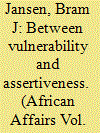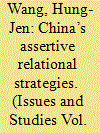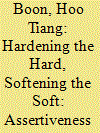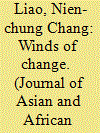| Srl | Item |
| 1 |
ID:
085984


|
|
|
|
|
| Publication |
2008.
|
| Summary/Abstract |
Resettlement to third countries is regarded as a durable solution to refugee crises. In Kakuma refugee camp in north-west Kenya, seeking a better life in industrialized countries has become a preoccupation for many refugees. In this article the effects of the practice of third country resettlement on the camp population are explored. Increased ease of communication with the diaspora, expanded knowledge of entitlements, and the high visibility of resettlement processing within the camp have increased the demand for resettlement. The article argues that the result is an environment that encourages refugees to cheat through claiming insecurity and negotiating vulnerability. Refugees come to believe that resettlement is something that can be actively achieved, rather than a benefit extended only to the genuinely vulnerable
|
|
|
|
|
|
|
|
|
|
|
|
|
|
|
|
| 2 |
ID:
162608


|
|
|
|
|
| Summary/Abstract |
In the past decade, observers in Western countries have been increasingly challenged to describe China’s rising power in one of two ways: as contributing to established world systems, or as a growing threat fulfilling certain predictions made at the end of the Cold War. For some, perceptions of increasingly assertive regional behaviors confirm that China’s self-proclaimed policy of pacifism is being used to cloak selfish national interest and power goals. The current international relations (IR) literature tends to treat China’s assertiveness as evidence that it is indeed a threat, with few attempts to conceptualize assertiveness as a relational strategy. In this paper, the author uses eight current and historical cases involving four relational strategies — engagement, boycotting, reciprocation, and pressing — to examine conventional assessments of assertiveness that focus solely on perceptions of and responses to threatening statements and behaviors made in defense of Chinese national interests. In the end, this paper tries to contribute to the general IR literature that has tended to misinterpret China’s assertiveness, which is actually an identity issue regarding bilateral relationality instead of power or interest calculations.
|
|
|
|
|
|
|
|
|
|
|
|
|
|
|
|
| 3 |
ID:
153323


|
|
|
|
|
| Summary/Abstract |
There is a growing view that the emerging brand of Chinese regional diplomacy in recent years is increasingly assertive. This article attempts to make better sense of this perceived more forceful Chinese diplomacy. It argues that Chinese regional behavior is more profitably understood through the lens of a two-pronged foreign policy strategy that combines two particular aspects. One is a tougher and more uncompromising approach toward issues that China regards as concerning its core interests. The other is a more flexible and cooperative position toward interests that, while significant, are of secondary importance.
|
|
|
|
|
|
|
|
|
|
|
|
|
|
|
|
| 4 |
ID:
161621


|
|
|
|
|
| Summary/Abstract |
The current debate on the question of whether China has become more assertive involves two opposing opinions on Beijing’s foreign policy orientation. This article argues that the key question is whether China is about to change its approach to foreign policy, one which has enabled its “peaceful rise” in recent decades. It examines variations in Chinese foreign policy by developing a set of interrelated indicators of changes in a state’s external behavior. The results reveal a marked increase in China’s military spending and power projection capability, foreign aid, and diplomatic initiatives after the 2008 global financial crisis, as well as an expansion of Beijing’s alliance commitments through the establishment of partnership relationships around the world. These findings not only support the increased assertiveness argument but also indicate a larger transformation in Chinese foreign policy—China is becoming more active diplomatically as part of its quest for great power status.
|
|
|
|
|
|
|
|
|
|
|
|
|
|
|
|